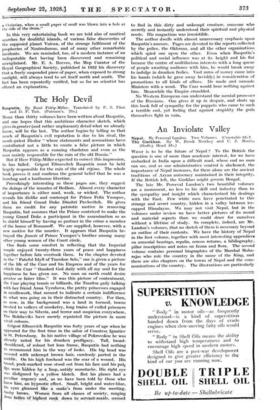The Holy Devil
Rasputin. By Rene FillOp-Miller. Translated by F. S. Flint and D. F. Tait. (Putnam's. 21s.)
MORE than thirty volumes have been written about Rasputin, and one hopes that this ambitious character sketch, which gives in greater (and rather unpleasant) detail what we already know, will be the last. The author begins by telling us that much of Rasputin's evil reputation is• due to his rival, the monk-priest Iliodor "whose statements and accusations have contributed not a little to create a false picture in which Rasputin appears as a cunning charlatan and even as the man mainly responsible for the ruin of the old Russia."
But if Herr Ffillip-Miller expected to correct this impression, he has failed. Grigori Eflmovitch Rasputin must be held largely responsible for the ruin of the old regime. The whole book proves it and confirms the general belief that he was a humbug and a loathsome libertine.
Provokingly interesting as these pages are, they suggest the doings of the inmates of Bedlam. Almost every character of importance is either mad, weak, or wicked. The author reveals his dislike and contempt for Prince Felix Yusupov, and his friend Grand Duke Dimitri Pavlovitch. He gives them no credit for any patriotic motive in removing Rasputin, but assumes that the Prince contrived to make the young Grand' Duke a participant in the assassination so as to shield himself by having as partner in the crime a member of the house of Romanoff. We are supplied, however, with a new motive for the murder. It appears that Rasputin be- trayed the fiancée of Prince Yusupov's brother among many other young women of the Court circle.
One finds some comfort in reflecting that the Imperial couple enjoyed twenty-three years of peace and happiness together before fate overtook them. In the chapter devoted to the "Fateful Idyll of Tzarskoe Selo," one is given a picture of the life of the Czar and his Empress and of the years for which the Czar "thanked God daily with all my soul for the happiness he has given me. No man on earth could desire greater or fairer bliss." It was this picture of contentment, the Czar playing tennis or billiards, the Tzaritsa gaily talking with her friend Anna Vyrubova, the pretty princesses engaged in needlework, that seemed to indicate a. certain indifference to what was going on in their distracted country. For then, as now, in the background was a land in turmoil, towns treated to volleys of musketry, long trains of exiled prisoners on their way to Siberia, and terror and suspicion everywhere. The Bolsheviks have merely repainted the picture in more Vivid colours.
Grigori Efimovich Rasputin was forty years of age when he appeared for the first time in the salon of Countess Ignatiev in St. Petersburg. In his native village of Pokrovskoe he was already noted for his drunken profligacy. Tall, broad- shouldered, of robust but lean frame, Rasputin had nothing to recommend him in the way of looks. His big head was covered with unkempt brown hair, carelessly parted in the middle. On his high forehead was the scar of a wound. His broad, pock-marked nose stood out from his face and his pale IIPS were hidden by a. limp, untidy moustache. His right eye was disfigured by a yellow blotch. But his glance had a Peculiar urgency and, as we have been told by those who knew him, an hypnotic effect. Small, bright and water-blue, hit eyes gleamed like. a snake's from under the meeting, bushy brows. Women from all classes of society, ranging hem ladies of highest rank down to servant maids, seethed to find in his dirty and unkempt creature, someone who secretly and instantly understood their spiritual and physical needs. His magnetism was irresistible.
The author dwells with almost unnecessary emphasis upon Rasputin's amours. Pages are devoted to the reports collected by the police, the Olchrana, and all the other organizations which spied one upon the other. Even when Rasputin's political and social influence was at its height and his flat became the centre of multifarious interests with a long queue of people awaiting audience with him, he would break away to indulge in drunken frolics. Vast sums of money came into his hands (which he gave away lavishly) in consideration of promotions to all kinds of offices. He made and unmade Ministers with a word. The Czar would hear nothing against him. Meanwhile the Empire crumbled.
No Western European can understand the mental processes of the Russians. One gives it up in despair, and shuts up this book full of sympathy for the puppets who came to such a terrible end, yet feeling that against stupidity the gods themselves fight in vain.






































 Previous page
Previous page